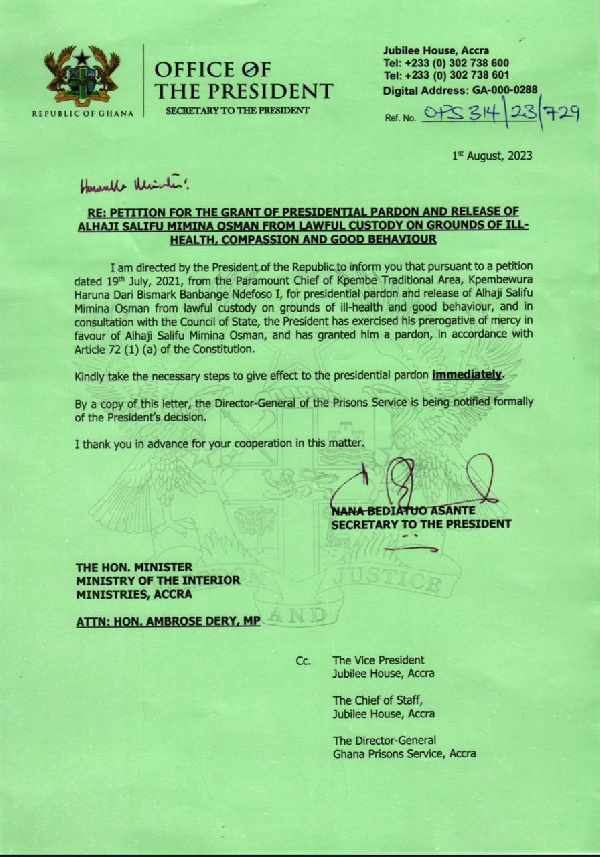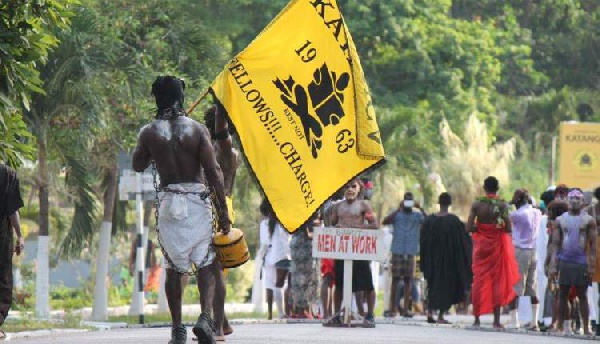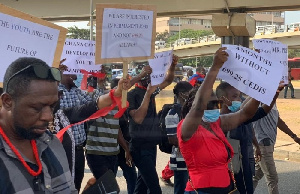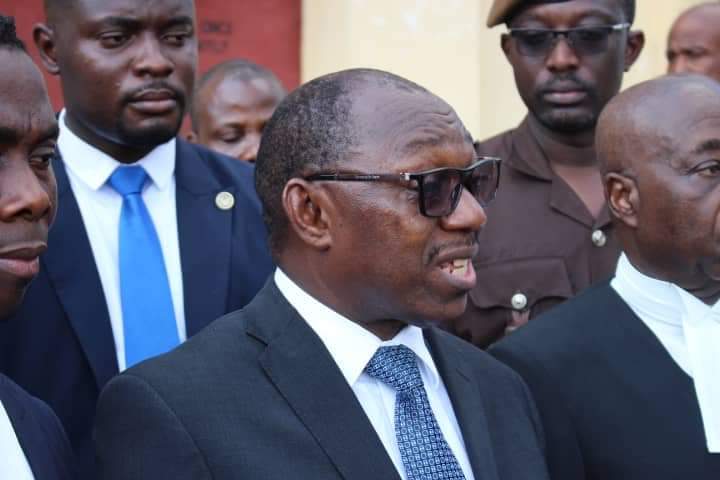NCA scandal: Alhaji Salifu Mimina Osman granted a presidential pardon

It follows a petition he received from the Chief of the Kpembe Traditional Area requesting that Alhaji Osman be freed from prison custody on the grounds of good behavior and ill-health.
In a letter dated August 1, 2023, and signed by the Secretary to President Nana Bediatuo Asante, the President charged the Minister of the Interior to take the necessary steps to give effect to the presidential pardon immediately.
“…in consultation with the Council of State, the President has exercised the prerogative of mercy in favour of Alhaji Salifu Mimina Osman, and has granted him a pardon, in accordance with Article 72(1) (a) of the Constitution. Kindly take the necessary steps to give effect to the presidential pardon immediately.”
By a copy of this letter, the Director General of the Prison Service is being notified formally of the President’s decision” the letter stressed.
Alhaji Salifu Mimina Osman, a son of the Kpembe Traditional Area, was sentenced to a five-year jail term in 2020 for wilfully causing financial loss to the state in what has become known as the National Communications Authority (NCA) scandal.

Background
On May 11, 2020, three former board members of the National Communications Authority (NCA) were sentenced to a total of 16 years’ imprisonment with hard labour by an Accra High Court for misapplying funds in the purchase of controversial surveillance equipment for the National Security Council Secretariat.
Eugene Baffoe-Bonnie, a former Board Chairman; William Mathew Tetteh-Tevie, a former Director General; and Alhaji Salifu Osman Mimina, a former Deputy National Security Coordinator on the NCA Board were found guilty of 14 different charges, including causing financial loss to the state and contravention of the Public Procurement Act, by the court presided over by Justice Eric Kyei Baffour, a Court of Appeal judge sitting as a High Court judge.
Mr. Baffoe-Bonnie was found guilty of eight charges, including conspiracy, causing financial loss to the state, money laundering and using public office for profit, and was sentenced to six years’ imprisonment with hard labour.
The court found Mr. Tetteh-Tevie guilty of five charges, including conspiracy, causing financial loss to the state and Contravention of Public Procurement Act and sentenced him to five years’ imprisonment.
Alhaji Osman, on the other hand, was found guilty of five charges, including conspiracy, causing financial loss to the state and Contravention of the Public Procurement Act and was also sentenced to five years imprisonment.
Seizure of Properties
The court also ordered the seizure of the properties of the convicts to defray the three million dollars financial loss caused to the state.
Two other accused persons – Nana Owusu Ensaw, a former board member, and George Dereck Oppong, a private businessman and Director of Infraloks Development Limited – were acquitted and discharged by the court.
Case Genesis
The five were hauled before an Accra High Court in December 2017 with a total of 17 charges, including stealing, money laundering, among others, to which they all pleaded not guilty.
The prosecution led by the Director of Public Prosecution (DPP), Yvonne Attakora-Obuobisa, called six witnesses, namely Abena Asarfo Adjei, Director of Legal Affairs at NCA; Dr. Isaac Yaw Ani, Deputy Director General in charge of Management and Operations; Colonel Michael Kwadwo Poku, Director of Operations at National Security Secretariat; Duncan Opare, Deputy National Security Coordinator; and Detective Chief Inspector Michael Nkrumah, the investigator of the case.
No Case
The accused persons, at the close of the prosecution’s case, filed applications for submission of no case, saying the prosecution could not prove beyond reasonable doubt a case against them.
Justice Kyei Baffour dismissed the applications and ordered the accused persons to open their defence although he struck out four of the six charges against Dr. Ensaw.
Key Defence
In opening their defence, the accused persons respectively denied all the charges levelled against them and also denied benefitting from the purchase of the cyber security equipment.
In-Camera Testimony
Alhaji Osman’s testimony was, however, heard in camera because he said his evidence bordered on national security.
In the course of the trial, the Court of Appeal granted the appeal of Dr. Ensaw that he had no case to answer and was discharged; therefore, the trial court did not include his case in the final judgement.
The private businessman, Mr. Oppong, was acquitted and discharged because the court held that he could not have known that the purchase of the equipment did not receive approval of the NCA board, adding that he was only acting as a businessman who had been engaged to provide a service.
Main Judgement
Justice Kyei Baffour found that the purchase of the Pegasus equipment did not receive the approval of the NCA board as mandated by law.
He said the prosecution was able to prove their case beyond reasonable doubt that the three conspired and acted in a way that cost a financial loss of three million dollars to the state in the purchase of the equipment.
Guilty or Not Guilty
The court held that there was no evidence to show that the accused conspired to steal, but on the charge of using public office for profit, Mr. Baffoe-Bonnie was found guilty as he had confessed in his police caution statement that they benefitted financially from the purchase of the equipment, but Mr. Tetteh-Tevie and Alhaji Osman were not guilty of the same charge despite Baffoe-Bonnie’s admission.
WATCH Our latest Episode with Kennedy Agyapong in South Africa below:
Source: mynewsgh.com





